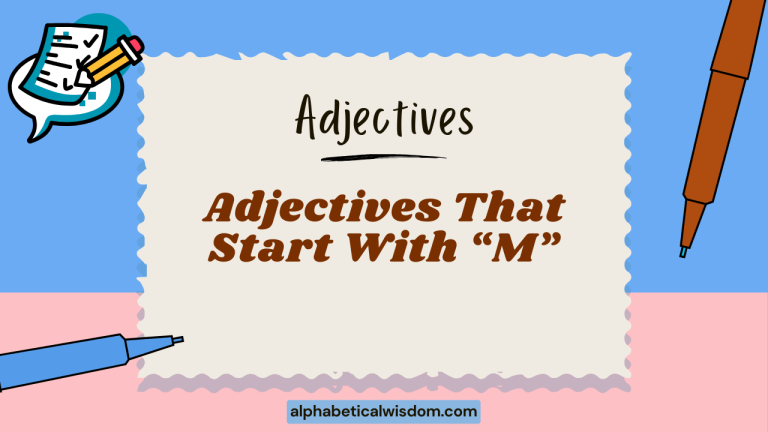Adjectives Starting With N: A Comprehensive Grammar Guide
Adjectives are the vibrant descriptors of the English language, adding color and specificity to our nouns. Mastering adjectives, particularly those starting with ‘N,’ is crucial for enhancing both written and spoken communication.
This guide provides an in-depth exploration of adjectives that begin with ‘N,’ covering their definitions, types, usage rules, and common mistakes. Whether you’re a student, a language enthusiast, or simply looking to refine your English skills, this resource will equip you with the knowledge to use these adjectives effectively and confidently.
Table of Contents
- Introduction
- Definition of Adjectives Starting With N
- Structural Breakdown
- Types and Categories of Adjectives Starting With N
- Examples of Adjectives Starting With N
- Usage Rules for Adjectives Starting With N
- Common Mistakes With Adjectives Starting With N
- Practice Exercises
- Advanced Topics
- FAQ
- Conclusion
Definition of Adjectives Starting With N
An adjective is a word that modifies a noun or pronoun, providing more detail about its qualities, characteristics, or attributes. Adjectives starting with ‘N’ are no different; they serve the same purpose of adding descriptive information to nouns and pronouns, but their initial letter is, of course, ‘N.’ These adjectives can describe a wide range of attributes, from physical characteristics and emotional states to origins and quantities.
Understanding these adjectives is key to expressive and accurate communication.
The primary function of an adjective is to provide additional information about the noun it modifies. This information can be related to color, size, shape, origin, condition, or any other attribute that helps to distinguish the noun from others. Adjectives answer questions like “What kind?”, “Which one?”, or “How many?” when referring to a noun. For example, in the phrase “a nautical adventure,” the adjective “nautical” specifies the type of adventure.
Adjectives can be classified based on their function and the type of information they convey. Some common classifications include descriptive adjectives, which describe qualities; proper adjectives, which are derived from proper nouns; and quantitative adjectives, which indicate quantity or amount.
Adjectives starting with ‘N’ can fall into any of these categories, depending on their specific meaning and usage. By understanding these classifications, learners can better grasp the nuances of adjective usage and improve their overall grammar skills.
Structural Breakdown
Adjectives, including those beginning with ‘N,’ typically precede the noun they modify. This is the most common structure in English sentences. For example, “a nice day,” where “nice” describes the noun “day.” However, adjectives can also follow a linking verb, such as “is,” “are,” “was,” or “were.” In this case, the adjective describes the subject of the sentence. For example, “The weather is nasty,” where “nasty” describes the subject “weather.”
The placement of adjectives can sometimes influence the meaning or emphasis of a sentence. While placing an adjective before a noun is standard, placing it after a linking verb can draw more attention to the quality being described. Consider the difference between “a nervous student” and “The student is nervous.” In the first sentence, the focus is on the type of student, while in the second sentence, the focus is on the student’s emotional state.
Adjectives can also be modified by adverbs, which further enhance their meaning. For example, in the phrase “a nearly finished project,” the adverb “nearly” modifies the adjective “finished,” indicating the degree to which the project is complete. This ability to be modified by adverbs adds another layer of complexity and nuance to adjective usage. Understanding these structural elements is crucial for constructing grammatically correct and expressive sentences.
Types and Categories of Adjectives Starting With N
Descriptive Adjectives
Descriptive adjectives, also known as qualitative adjectives, describe the qualities or characteristics of a noun. These adjectives provide details about the noun’s appearance, personality, or any other attribute that helps to paint a clearer picture.
Adjectives starting with ‘N’ that fall into this category include words like “nice,” “nifty,” “natural,” “new,” and “notable.” These words add richness and detail to descriptions, making them more vivid and engaging.
Descriptive adjectives play a crucial role in creating imagery and conveying emotions in writing and speech. For example, “a nice gesture” evokes a sense of kindness and warmth, while “a natural landscape” suggests unspoiled beauty. The effective use of descriptive adjectives can significantly enhance the impact of communication, allowing the speaker or writer to convey their message more effectively. These adjectives are essential for creating compelling narratives and engaging descriptions.
Many descriptive adjectives can also be used in comparative and superlative forms to indicate degrees of quality. For example, “nicer” and “nicest” are the comparative and superlative forms of “nice,” respectively.
This allows for even more precise and nuanced descriptions. Understanding how to use these forms correctly is essential for mastering descriptive adjective usage.
The ability to compare and contrast qualities adds depth and sophistication to language skills.
Proper Adjectives
Proper adjectives are formed from proper nouns and are always capitalized. They describe something as being related to or characteristic of the proper noun.
Adjectives starting with ‘N’ that fall into this category are often derived from place names or names of people. For example, “Nigerian” (from Nigeria) or “Newtonian” (from Newton) are proper adjectives.
These adjectives help to specify the origin or association of a noun.
Proper adjectives are essential for indicating the origin or affiliation of a noun. For example, “Nigerian cuisine” refers to food from Nigeria, while “Newtonian physics” refers to the physics developed by Isaac Newton. These adjectives provide important contextual information that helps to clarify the meaning of the noun. Proper adjectives are vital for precise and accurate communication in various fields, including history, science, and culture.
It is important to remember that proper adjectives are always capitalized, regardless of their position in a sentence. This capitalization distinguishes them from common adjectives and signals their connection to a specific proper noun.
Proper adjectives are an important part of English grammar and are essential for conveying specific cultural, geographical, or historical information. Correct capitalization is critical for maintaining clarity and avoiding confusion.
Quantitative Adjectives
Quantitative adjectives indicate the quantity or amount of a noun. They answer the question “How many?” or “How much?” While adjectives starting with ‘N’ are less commonly used as quantitative adjectives, some can imply quantity in certain contexts.
For example, “numerous” can be considered a quantitative adjective. Understanding how to use these adjectives correctly is essential for accurate and precise communication when referring to quantities.
Quantitative adjectives can be either definite or indefinite. Definite quantitative adjectives specify an exact number, while indefinite quantitative adjectives indicate an approximate or general quantity.
For example, “five” is a definite quantitative adjective, while “several” is an indefinite quantitative adjective. The choice between definite and indefinite adjectives depends on the level of precision required in the communication.
When using quantitative adjectives, it is important to consider the countability of the noun being modified. Countable nouns can be counted (e.g., books, chairs), while uncountable nouns cannot be counted (e.g., water, sand).
Different quantitative adjectives are used with countable and uncountable nouns. For example, “many” is used with countable nouns, while “much” is used with uncountable nouns.
Understanding this distinction is crucial for using quantitative adjectives correctly.
Examples of Adjectives Starting With N
Descriptive Adjectives Examples
Descriptive adjectives add detail and color to our language. Here are some examples in tables to help you understand their usage.
| Adjective | Example Sentence | Explanation |
|---|---|---|
| Naive | The naive student believed everything the teacher said. | Describes a lack of experience or worldly knowledge. |
| Nasty | The weather outside is quite nasty today. | Describes something unpleasant or disagreeable. |
| Natural | She prefers natural remedies over modern medicine. | Describes something existing in or caused by nature. |
| Neat | He keeps his room very neat and organized. | Describes something tidy and orderly. |
| Necessary | Water is necessary for survival. | Describes something essential or required. |
| Negative | The test result came back negative. | Describes something unfavorable or undesirable. |
| Nervous | She felt nervous before her presentation. | Describes someone anxious or apprehensive. |
| New | They bought a new car last week. | Describes something recently made or acquired. |
| Nice | He is a very nice person to talk to. | Describes someone pleasant or agreeable. |
| Nifty | That’s a nifty gadget you have there. | Describes something clever or useful. |
| Nimble | The nimble dancer moved gracefully across the stage. | Describes someone quick and light in movement. |
| Noisy | The children were very noisy during the game. | Describes something full of noise. |
| Normal | It’s normal to feel nervous before an exam. | Describes something conforming to a standard. |
| Notable | He made a notable contribution to the project. | Describes something worthy of attention. |
| Notorious | The pirate was notorious for his cruelty. | Describes someone famous for bad reasons. |
| Novel | The scientist proposed a novel approach to the problem. | Describes something new and original. |
| Numerous | There were numerous errors in the report. | Describes something existing in large numbers. |
| Nutritious | Fruits and vegetables are nutritious foods. | Describes something nourishing or healthful. |
| Neighborly | The neighborly residents welcomed the new family to the community. | Describes someone kind and helpful to their neighbors. |
| Nurturing | She has a nurturing personality and always cares for others. | Describes someone who fosters growth and development. |
| Nameless | The nameless soldier was honored for his bravery. | Describes someone without a name or whose name is unknown. |
| Narrative | The narrative poem told a captivating story. | Describes something that tells a story. |
| Natal | Her natal home was in the countryside. | Describes something related to birth. |
| Navigable | The river was navigable by small boats. | Describes something suitable for sailing. |
The table above showcases a variety of descriptive adjectives starting with the letter ‘N,’ each accompanied by an example sentence and an explanation of its usage. This helps to illustrate how these adjectives can be used to add detail and specificity to your writing and speech.
Proper Adjectives Examples
Proper adjectives connect nouns to specific places, people, or things. Here are examples to illustrate their usage.
| Adjective | Example Sentence | Explanation |
|---|---|---|
| Newtonian | Newtonian physics revolutionized our understanding of gravity. | Relating to Isaac Newton or his theories. |
| Nigerian | She enjoys Nigerian cuisine. | Relating to Nigeria. |
| Nietzschean | His philosophy has Nietzschean undertones. | Relating to Friedrich Nietzsche or his philosophy. |
| Norman | The Norman conquest changed English history. | Relating to Normandy or the Normans. |
| Napoleonic | The Napoleonic era was a time of great upheaval in Europe. | Relating to Napoleon Bonaparte or his time. |
| Nordic | The Nordic countries are known for their high quality of life. | Relating to Scandinavia or the Nordic countries. |
| Nestorian | The Nestorian Christians spread their faith across Asia. | Relating to Nestorius or Nestorianism. |
| Neanderthal | Neanderthal DNA is found in many modern humans. | Relating to Neanderthals. |
| Neronian | The Neronian persecution of Christians was a dark chapter in history. | Relating to Nero. |
| Neo-Darwinian | The Neo-Darwinian synthesis combined Darwin’s theory with genetics. | Relating to a modern version of Darwinism. |
The table above provides examples of proper adjectives starting with ‘N,’ demonstrating how they are derived from proper nouns and used to describe something related to that noun. Note that all proper adjectives are capitalized.
Quantitative Adjectives Examples
While less common, here are examples where ‘N’ adjectives can imply quantity.
| Adjective | Example Sentence | Explanation |
|---|---|---|
| Numerous | There were numerous complaints about the new policy. | Indicates a large number of something. |
| No | There are no apples left in the basket. | Indicates the absence of something. |
The table above illustrates the use of adjectives starting with ‘N’ that can function as quantitative adjectives, indicating the quantity or absence of something. Note that “numerous” suggests a large quantity and “no” indicates absence.
Usage Rules for Adjectives Starting With N
Adjectives typically precede the nouns they modify, but they can also follow linking verbs such as “is,” “are,” “was,” “were,” “seem,” and “become.” When an adjective follows a linking verb, it describes the subject of the sentence rather than modifying a specific noun.
Rule 1: Placement Before Nouns
In most cases, adjectives are placed directly before the noun they modify. This is the most common and straightforward usage. For example, “a natural disaster” or “a new car.”
Rule 2: Placement After Linking Verbs
Adjectives can follow linking verbs to describe the subject of the sentence. For example, “The weather is nasty” or “She seems nervous.”
Rule 3: Coordinate Adjectives
When using multiple adjectives to describe the same noun, they are called coordinate adjectives. Coordinate adjectives must be separated by commas. For example, “a nice, friendly neighbor.” However, if the adjectives are not coordinate, meaning they modify each other, then no comma is needed. For example, “a new red car” (where “new” modifies “red car”).
Rule 4: Proper Adjective Capitalization
Proper adjectives, which are derived from proper nouns, must always be capitalized. For example, “Nigerian cuisine” or “Newtonian physics.”
Rule 5: Comparative and Superlative Forms
Many adjectives can be used in comparative and superlative forms to indicate degrees of quality. For example, “nicer” and “nicest” are the comparative and superlative forms of “nice.” These forms are used to compare two or more things. For adjectives with multiple syllables, use “more” and “most” (e.g., more notable, most notable).
Rule 6: Adjective Order
When using multiple adjectives before a noun, there is a general order that should be followed. This order is: opinion, size, age, shape, color, origin, material, and purpose. For example, “a nice small new red Italian car.”
Common Mistakes With Adjectives Starting With N
Using adjectives correctly can be tricky. Here are some common mistakes to avoid.
| Incorrect | Correct | Explanation |
|---|---|---|
| The weather is nastyly. | The weather is nasty. | Adjectives, not adverbs, follow linking verbs. |
| A nice, friendly, neighbor new. | A nice, friendly new neighbor. | Adjectives should be placed in the correct order. |
| She is a Nigerian women. | She is a Nigerian woman. | Proper adjectives must be capitalized. |
| He is more nicer than her. | He is nicer than her. | Do not use “more” with adjectives that already have comparative forms. |
| This is the most nicest car. | This is the nicest car. | Do not use “most” with adjectives that already have superlative forms. |
| The house is natural and old. | The house is natural and old. OR The house is natural, and old. | Ensure correct punctuation with coordinate adjectives. |
| Numerous of people attended. | Numerous people attended. | Avoid unnecessary prepositions after adjectives. |
| Newtonian’s physics are complex. | Newtonian physics are complex. | Avoid possessive forms with proper adjectives. |
The table above highlights common mistakes made when using adjectives, along with the correct usage and an explanation of the error. Avoiding these mistakes will help improve the clarity and accuracy of your writing and speech.
Practice Exercises
Test your knowledge with these exercises.
| Question | Answer |
|---|---|
| 1. The _______ child was afraid of the dark. (nervous / nervously) | nervous |
| 2. She bought a _______ car. (new red / red new) | new red |
| 3. He is a _______ scientist. (Newtonian / newtonian) | Newtonian |
| 4. The weather is _______. (nasty / nastily) | nasty |
| 5. There were _______ errors in the report. (numerous / numerously) | numerous |
| 6. She has a _______ personality, always caring for others. (nurturing / nurture) | nurturing |
| 7. The _______ landscape was breathtaking. (natural / naturally) | natural |
| 8. He is a _______ person to work with. (nice / nicely) | nice |
| 9. The _______ dancer moved with grace. (nimble / nimbly) | nimble |
| 10. There are _______ apples left. (no / none) | no |
| Question | Answer |
|---|---|
| 11. The ______________ cuisine is known for its spicy flavors. (Nigerian / Nigeria) | Nigerian |
| 12. The ______________ theories changed the way we understand physics. (Newtonian / Newton) | Newtonian |
| 13. He made a ______________ contribution to the project, earning him recognition. (notable / notably) | notable |
| 14. The ______________ child believed everything she was told. (naive / naively) | naive |
| 15. The ______________ town welcomed the new family with open arms. (neighborly / neighbor) | neighborly |
| 16. The ______________ approach to solving the problem proved to be successful. (novel / novelty) | novel |
| 17. The ______________ sea was dangerous to navigate during the storm. (nautical / nautically) | nautical |
| 18. The ______________ forest was filled with towering trees and lush vegetation. (natural / naturally) | natural |
| 19. The ______________ painting depicted a serene landscape. (narrative / narratively) | narrative |
| 20. She felt ______________ before her job interview, but tried to remain calm. (nervous / nervously) | nervous |
| Question | Answer |
|---|---|
| 21. The ______________ professor was known for his challenging lectures. (notorious / noted) | noted |
| 22. He is a very ______________ person, always willing to help others. (nice / nicely) | nice |
| 23. The ______________ residents organized a community cleanup event. (neighborly / neighborhood) | neighborly |
| 24. The ______________ design of the new building caught everyone’s attention. (novel / novelty) | novel |
| 25. The ______________ conditions made it difficult to see the road ahead. (nasty / nastiness) | nasty |
| 26. The ______________ food provided the body with essential vitamins and minerals. (nutritious / nutrition) | nutritious |
| 27. The ______________ children were excited to start their summer vacation. (numerous / number) | numerous |
| 28. The ______________ solution to the problem required careful planning and execution. (necessary / necessity) | necessary |
| 29. She is a ______________ and dedicated teacher, always putting her students first. (nurturing / nurture) | nurturing |
| 30. The ______________ sea was calm and inviting on the sunny day. (navigable / navigate) | navigable |
These practice exercises will help you reinforce your understanding of adjectives starting with ‘N’ and their correct usage in sentences. Review the explanations provided to further solidify your knowledge.
Advanced Topics
Nuance and Context
The meaning of an adjective can change depending on the context in which it is used. Understanding these nuances is crucial for effective communication.
For example, the adjective “natural” can have different meanings depending on the context. In the phrase “natural beauty,” it refers to unspoiled beauty, while in the phrase “natural gas,” it refers to a naturally occurring fuel.
Consider the adjective “nervous.” In the sentence “She felt nervous before the presentation,” it describes her emotional state. However, in the sentence “He has a nervous habit of tapping his foot,” it describes a recurring behavior.
These subtle differences in meaning can significantly impact the overall message of the sentence. Therefore, it is important to pay close attention to the context when interpreting the meaning of adjectives.
Furthermore, the connotations of adjectives can also vary depending on cultural and social factors. For example, the adjective “naive” can be seen as either positive or negative, depending on the context and the speaker’s perspective.
In some cases, it can suggest innocence and purity, while in others, it can imply a lack of intelligence or awareness. Being aware of these nuances is essential for avoiding misunderstandings and communicating effectively across different cultural contexts.
Adjective Order
In English, there is a general order that adjectives should follow when used together to modify a noun. This order is not always strictly enforced, but it is a helpful guideline for creating natural-sounding sentences.
The typical order is: opinion, size, age, shape, color, origin, material, and purpose.
For example, consider the phrase “a nice small new red Italian car.” In this phrase, “nice” is an opinion adjective, “small” is a size adjective, “new” is an age adjective, “red” is a color adjective, and “Italian” is an origin adjective. While it is possible to rearrange these adjectives, the resulting phrase would likely sound awkward or unnatural.
However, there are exceptions to this rule. Sometimes, the order of adjectives can be influenced by emphasis or personal preference.
In addition, certain adjectives are more flexible in their placement than others. For example, adjectives of opinion often come first, while adjectives of purpose often come last.
Understanding these nuances and exceptions is essential for mastering adjective order and creating fluent, natural-sounding English sentences.
FAQ
Here are some frequently asked questions about adjectives starting with ‘N’.
-
Q: What is the difference between a descriptive adjective and a proper adjective?
A: A descriptive adjective describes qualities or characteristics of a noun, while a proper adjective is derived from a proper noun and indicates origin or affiliation. For example, “nice” is a descriptive adjective, while “Nigerian” is a proper adjective.
-
Q: How do I know when to capitalize an adjective starting with ‘N’?
A: Only proper adjectives, which are derived from proper nouns, should be capitalized. Common adjectives, such as “nice” or “nasty,” should not be capitalized unless they begin a sentence.
-
Q: Can an adjective starting with ‘N’ be used as an adverb?
A: No, adjectives and adverbs are different parts of speech. Adjectives modify nouns, while adverbs modify verbs, adjectives, or other adverbs. While some words can function as both adjectives and adverbs, adjectives starting with ‘N’ are typically used only as adjectives. To use the meaning of an adjective as an adverb, you would typically use a related adverb form or rephrase the sentence.
-
Q: What is the correct order of adjectives when using multiple adjectives before a noun?
A: The general order of adjectives is: opinion, size, age, shape, color, origin, material, and purpose. For example, “a nice small new red Italian car.”
-
Q: How do I form the comparative and superlative forms of adjectives starting with ‘N’?
A: For most adjectives starting with ‘N,’ you can add “-er” and “-est” to form the comparative and superlative forms, respectively. For example, “nicer” and “nicest.” For longer adjectives, use “more” and “most” (e.g., more notable, most notable).
-
Q: What are some common mistakes to avoid when using adjectives starting with ‘N’?
A: Common mistakes include using adjectives as adverbs, misspelling proper adjectives, using incorrect adjective order, and using “more” or “most” with adjectives that already have comparative or superlative forms.
-
Q: How can the context of a sentence affect the meaning of an adjective starting with ‘N’?
A: The context of a sentence can significantly affect the meaning or connotation of an adjective. For example, “natural” can mean unspoiled beauty or a naturally occurring substance depending on the context.
-
Q: Are there any adjectives starting with ‘N’ that have negative connotations?
A: Yes, some adjectives starting with ‘N’ can have negative connotations. For example, “nasty” describes something unpleasant, and “nervous” describes someone anxious or apprehensive. The specific connotation depends on the context.
-
Q: Can adjectives starting with ‘N’ be used to describe abstract concepts?
A: Yes, adjectives starting with ‘N’ can be used to describe abstract concepts. For example, “natural” can describe a natural right, and “necessary” can describe a necessary condition.
-
Q: How can I improve my vocabulary of adjectives starting with ‘N’?
A: Read widely, pay attention to how adjectives are used in context, and practice using new adjectives in your own writing and speech. Use a dictionary or thesaurus to explore synonyms and related words.
Conclusion
Mastering adjectives that start with the letter ‘N’ is a valuable step in enhancing your English language skills. This guide has provided a comprehensive overview of these adjectives, covering their definitions, types, usage rules, common mistakes, and advanced topics.
By understanding these concepts and practicing their application, you can significantly improve your ability to communicate effectively and expressively.
Remember that adjectives are essential for adding detail and color to your language, allowing you to paint vivid pictures with your words. Whether you are describing a person, place, or thing, adjectives help to convey specific qualities and characteristics that make your communication more engaging and informative.
Keep practicing, and don’t be afraid to experiment with different adjectives to find the perfect fit for your message.
Continue to expand your vocabulary and deepen your understanding of grammar rules. The more you immerse yourself in the English language, the more confident and proficient you will become.
So, embrace the challenge, keep learning, and enjoy the journey of mastering adjectives that start with ‘N’ and beyond. Your efforts will undoubtedly pay off in improved communication skills and a greater appreciation for the richness and complexity of the English language.






